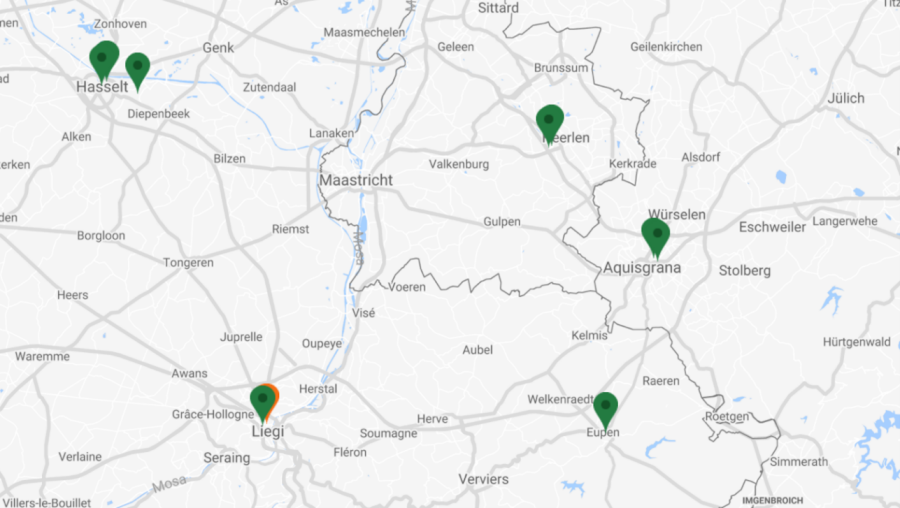What?
The cross-border region between Germany, Belgium and the Netherlands is characterised by high school dropout rates among vocational and technical students as well as vocational training programmes which do not meet labour market needs. As a result, businesses in the region suffer from skills and apprentice shortages. The EUR.Friends project aims to foster social inclusion and train the youth of the Meuse–Rhine Euroregion by providing young students, workers and job seekers with professional and intercultural skills training and organising cross-border in-company placements. It intends to expand the horizons of the young people involved, challenging them through the work placement in another language, and stimulating their curiosity through their interactions with another culture. To meet this objective the project main activities are:
- Organising cross-border in-company placements for vocational secondary students in accountancy, technology, construction and hospitality with the goal of developing their technical and communicative know-how while being immersed in another language and culture for a duration of 10 to 15 working days. They are supported by an open-source app for communicative help.
- Developing “language-culture” e-modules to address the needs of SME’s, higher education students and job seekers. These modules will equip students with the language and intercultural skills to thrive in their cross-border placements creating a digital communication platform for all young people in the cross-border region. The platform was designed via a “bottom-up” approach, involving extensive collaboration between the project partners and the region’s youth, ensuring that it effectively met their needs.
The project is designed to reduce the high dropout rates amongst vocational students in the region. By giving these students the opportunity to work across the border and develop their intercultural skills, supported by innovative tools and educational resources, it is believed that they will be energised and inspired to keep going with their studies and, later, careers.
Who?
A total of nine partners are involved in this project, located across the Meuse–Rhine Euroregion. The partnership is composed in a way to ensure smooth project implementation, with each partner acting in its specific fields of competences. Province de Liège, as lead partner, is in charge of the project coordination, while the more « technical » partners, such as schools, language centres, education centres, universities are in charge of the provision of professional and cultural skills to students, workers and job seekers. Regional and local authorities ensure an adequate political and administrative framework, based on the needs of the cross-border labour market. Development companies, as fundamental actors of the labour market, are involved in the organisation of cross-border in-company placements.
Where?
The students and companies involved in the project are from the three countries that compose the region: Belgium, The Netherlands and Germany. The three languages spoken in the cross-border region represent a key challenge in the provision of intercultural skills for students, workers and job seekers and the opportunity for mutual cultural exchange between the students and companies partaking in the work placements is accentuated by the region’s cross-border dimension.

How?
This project is co-funded by the Interreg Euregio Meuse-Rhin Programme 2014 - 2020, with an ERDF contribution of about 1.6 million EUR under the priority axis “social inclusion and training”. The project started in 2017 and ran until June 2021.
Results
The project organised 392 in-company cross-border placements and 5 company visits involving 99 students from 49 vocational secondary schools and 3 universities. Company visits were an alternative to the individual internships, they were more flexible and faster to implement entailing a half or full day visit for groups of students in more than one company. These visits offered students the possibility to cross more than one border and to become familiar with the structures, services and operations of different businesses. At the end of the placement, students received a Europass certificate indicating the competences they acquired to enhance their CV. In total, 232 businesses, including hotels, hospitals, nursing homes, shops etc. participated in the project. To celebrate trainees and give them the sense of belonging to a real EU community several ceremonies were organised in the partner regions such as Liège (2018), Eupen (2019) and Hasselt (2020).
The project also designed a free EUR.Friends trilingual app which allows students to make contact with businesses about potential internships and provides them with support during these internships. Beyond this was the creation of the multimedia platform «Euregiowaves» (https://euregiowaves.eu/) designed to be used by all young people in the Meuse–Rhine Euroregion. This platform includes a database of schools and businesses in the region as well as a specific section to promote communication amongst its young users.
The project implemented a sustainable network of schools and companies to organise cross-border placements and ultimately valorise vocational education pathways. The digital tools created are maintained to facilitate the placement process, enabling, and encouraging relevant stakeholders to get involved. Lastly, long-term school-company partnerships are established, and this experience proved to be a win-win for both sides.
The type of partners involved in the project is crucial to ensure the project’s replicability. The partners involved must have a complementary network of relevant stakeholders (companies and educational institutions) to promote cross-border mobility and interactions. By gathering their resources, they can promote placements and the digital tools. The participation of partners from the education field is essential in order to create appropriate content for the e-learning modules and to engage students in the platform contribution.
More information
- EUR.Friends | Interreg Euregio Meuse-Rhine (interregemr.eu)
- http://www.provincedeliege.be/fr/www-eur-friends
- Illoggja biex tippowstja l-kummenti

